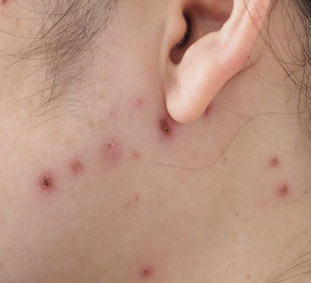
| ABOUT THE COURSE | |
|---|---|
| Price | £75 per dose |
| Age Requirements | 1-65 years |
| Doses per course | 2 |
| Dose requirements | Second dose to be given 4-8 weeks after the first |

What is Chickenpox?
Chickenpox is a common viral infection that is usually caught during childhood. It is caused by the varicella virus, which is transmitted very easily, and outbreaks can spread quickly. Sufferers develop an uncomfortable, irritating itchy rash that can spread to affect the entire surface of the body. Although a chickenpox infection is not usually dangerous, it can be extremely uncomfortable and distressing. Especially for children.
The rash usually begins as small red spots which develop into fluid filled blisters. These blisters often leak fluid which is very infectious. They eventually burst to form sore dry scabs. The rash is usually extremely itchy and unpleasant.
You can read more information about chickenpox from the NHS here.
How it works?

FAQs
While chickenpox is most commonly caught during childhood, chickenpox can be caught by patients of any age. Symptoms often become more severe with age and adults usually suffer worse symptoms than children.
Anyone with a weakened immune system can be particularly vulnerable to chickenpox and its symptoms.
In rare cases, it can lead to critical skin infections, permanent scarring, brain damage, pneumonia, or even death.
The chickenpox vaccine offers protection against chickenpox.
The vaccine contains a weakened fragment of the varicella virus which is the virus that causes chickenpox. Once administered, the immune system reacts to this fragment in the vaccine and develops the antibodies needed against the virus. So, if the body encounters the chickenpox virus again, then the immune system already has the defenses to fight off the virus before it causes a chickenpox infection.
Vaccination against chickenpox can be given to anyone aged between 1 and 65 years of age at the time of the first vaccination.
The chickenpox vaccine is only available on the NHS vaccination schedule for a select cohort of patients with serious health conditions. You can read more about the vaccine from the NHS here.
Although it is not given to everyone by the NHS, the vaccine is an important step for patients to take in order to avoid an uncomfortable and irritating chickenpox infection.
Please note that the vaccination is not suitable for patients who are pregnant or trying to become pregnant nor is it recommended while breastfeeding. Similarly, the service is unsuitable for anyone with a weakened immune system or who has previously experienced an allergic reaction to a vaccine. In these circumstances, please consult your GP to discuss your options.
If you have had the MMR vaccine recently then please bear in mind that there must be a 4-week gap between the administration of the MMR vaccine and chickenpox vaccination.
The vaccination requires two doses to be given 4-8 weeks apart. The vaccine is usually administered into the deltoid muscle in the upper arm.
Vaccinations tend not to cause too much irritation however they can cause some swelling and redness at the injection site. This sort of localized reaction can occur after any vaccination or injection.
Sometimes, a mild fever might result from the vaccination. We recommend keeping an eye out for any signs of a raised temperature and using an appropriate dose of paracetamol if necessary. Our pharmacists can advise you further on this.
A small number of patients will develop a mild rash. This will usually pass within a couple of days.
In rare cases people who have recently received the chickenpox vaccine can transmit the virus to others. It is important to remember this is you are very likely to encounter unvaccinated pregnant women who have not had chickenpox, newborn babies, those with a weakened immune system or who might be at serious risk if they develop chickenpox.
If you’re concerned following a vaccination, then you can obtain urgent advice from your GP or by phoning the NHS on 111. In the case of an emergency please call an ambulance on 999.




















